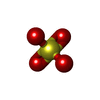[English] 日本語
 Yorodumi
Yorodumi- PDB-2zem: Crystal structure of the human glutaminyl cyclase mutant D248Q at... -
+ Open data
Open data
- Basic information
Basic information
| Entry | Database: PDB / ID: 2zem | ||||||
|---|---|---|---|---|---|---|---|
| Title | Crystal structure of the human glutaminyl cyclase mutant D248Q at 2.18 angstrom resolution | ||||||
 Components Components | Glutaminyl-peptide cyclotransferase | ||||||
 Keywords Keywords | TRANSFERASE / hydrogen bond network / glutaminyl cyclase / pyroglutamate / site-directed mutagenesis / proton transfer / Acyltransferase / Glycoprotein / Metal-binding | ||||||
| Function / homology |  Function and homology information Function and homology informationpeptidyl-pyroglutamic acid biosynthetic process, using glutaminyl-peptide cyclotransferase / glutaminyl-peptide cyclotransferase / glutaminyl-peptide cyclotransferase activity / protein modification process / specific granule lumen / tertiary granule lumen / ficolin-1-rich granule lumen / Neutrophil degranulation / extracellular exosome / extracellular region / zinc ion binding Similarity search - Function | ||||||
| Biological species |  Homo sapiens (human) Homo sapiens (human) | ||||||
| Method |  X-RAY DIFFRACTION / X-RAY DIFFRACTION /  SYNCHROTRON / SYNCHROTRON /  FOURIER SYNTHESIS / Resolution: 2.18 Å FOURIER SYNTHESIS / Resolution: 2.18 Å | ||||||
 Authors Authors | Huang, K.F. / Wang, Y.R. / Chang, E.C. / Chou, T.L. / Wang, A.H. | ||||||
 Citation Citation |  Journal: Biochem.J. / Year: 2008 Journal: Biochem.J. / Year: 2008Title: A conserved hydrogen-bond network in the catalytic centre of animal glutaminyl cyclases is critical for catalysis. Authors: Huang, K.F. / Wang, Y.R. / Chang, E.C. / Chou, T.L. / Wang, A.H. | ||||||
| History |
|
- Structure visualization
Structure visualization
| Structure viewer | Molecule:  Molmil Molmil Jmol/JSmol Jmol/JSmol |
|---|
- Downloads & links
Downloads & links
- Download
Download
| PDBx/mmCIF format |  2zem.cif.gz 2zem.cif.gz | 155.5 KB | Display |  PDBx/mmCIF format PDBx/mmCIF format |
|---|---|---|---|---|
| PDB format |  pdb2zem.ent.gz pdb2zem.ent.gz | 121.3 KB | Display |  PDB format PDB format |
| PDBx/mmJSON format |  2zem.json.gz 2zem.json.gz | Tree view |  PDBx/mmJSON format PDBx/mmJSON format | |
| Others |  Other downloads Other downloads |
-Validation report
| Summary document |  2zem_validation.pdf.gz 2zem_validation.pdf.gz | 443.9 KB | Display |  wwPDB validaton report wwPDB validaton report |
|---|---|---|---|---|
| Full document |  2zem_full_validation.pdf.gz 2zem_full_validation.pdf.gz | 452.8 KB | Display | |
| Data in XML |  2zem_validation.xml.gz 2zem_validation.xml.gz | 31.7 KB | Display | |
| Data in CIF |  2zem_validation.cif.gz 2zem_validation.cif.gz | 47.6 KB | Display | |
| Arichive directory |  https://data.pdbj.org/pub/pdb/validation_reports/ze/2zem https://data.pdbj.org/pub/pdb/validation_reports/ze/2zem ftp://data.pdbj.org/pub/pdb/validation_reports/ze/2zem ftp://data.pdbj.org/pub/pdb/validation_reports/ze/2zem | HTTPS FTP |
-Related structure data
| Related structure data | 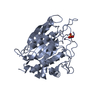 2zedC 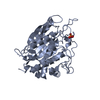 2zeeC  2zefC 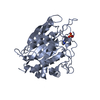 2zegC  2zehC 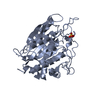 2zelC 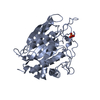 2zenC  2zeoC  2zepC 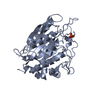 2afmS S: Starting model for refinement C: citing same article ( |
|---|---|
| Similar structure data |
- Links
Links
- Assembly
Assembly
| Deposited unit | 
| |||||||||
|---|---|---|---|---|---|---|---|---|---|---|
| 1 | 
| |||||||||
| 2 | 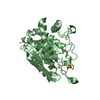
| |||||||||
| 3 | 
| |||||||||
| Unit cell |
| |||||||||
| Components on special symmetry positions |
|
- Components
Components
| #1: Protein | Mass: 37570.438 Da / Num. of mol.: 2 / Fragment: residues 33-361 / Mutation: D248Q Source method: isolated from a genetically manipulated source Source: (gene. exp.)  Homo sapiens (human) / Tissue: bone marow / Gene: QPCT / Plasmid: pET32a / Species (production host): Escherichia coli / Production host: Homo sapiens (human) / Tissue: bone marow / Gene: QPCT / Plasmid: pET32a / Species (production host): Escherichia coli / Production host:  References: UniProt: Q16769, glutaminyl-peptide cyclotransferase #2: Chemical | #3: Chemical | #4: Water | ChemComp-HOH / | |
|---|
-Experimental details
-Experiment
| Experiment | Method:  X-RAY DIFFRACTION / Number of used crystals: 1 X-RAY DIFFRACTION / Number of used crystals: 1 |
|---|
- Sample preparation
Sample preparation
| Crystal | Density Matthews: 3 Å3/Da / Density % sol: 59.05 % |
|---|---|
| Crystal grow | Temperature: 298 K / Method: vapor diffusion, hanging drop / pH: 6.5 Details: 2%-4% dioxane, 1.6-1.8M ammonium sulfate, 100mM Mes, pH 6.5, VAPOR DIFFUSION, HANGING DROP, temperature 298K |
-Data collection
| Diffraction | Mean temperature: 100 K |
|---|---|
| Diffraction source | Source:  SYNCHROTRON / Site: SYNCHROTRON / Site:  ALS ALS  / Beamline: 4.2.2 / Wavelength: 1 Å / Beamline: 4.2.2 / Wavelength: 1 Å |
| Detector | Type: MARMOSAIC 225 mm CCD / Detector: CCD / Date: Aug 30, 2006 / Details: mirrors |
| Radiation | Monochromator: GRAPHITE / Protocol: SINGLE WAVELENGTH / Monochromatic (M) / Laue (L): M / Scattering type: x-ray |
| Radiation wavelength | Wavelength: 1 Å / Relative weight: 1 |
| Reflection | Resolution: 2.18→50 Å / Num. all: 47679 / Num. obs: 46201 / % possible obs: 96.9 % / Observed criterion σ(F): 0 / Observed criterion σ(I): 1 / Redundancy: 3.9 % / Biso Wilson estimate: 37.8 Å2 / Rmerge(I) obs: 0.069 / Rsym value: 0.069 / Net I/σ(I): 23.1 |
| Reflection shell | Resolution: 2.18→2.26 Å / Redundancy: 3.7 % / Rmerge(I) obs: 0.597 / Mean I/σ(I) obs: 2.3 / Num. unique all: 4519 / Rsym value: 0.597 / % possible all: 95.9 |
- Processing
Processing
| Software |
| |||||||||||||||||||||||||
|---|---|---|---|---|---|---|---|---|---|---|---|---|---|---|---|---|---|---|---|---|---|---|---|---|---|---|
| Refinement | Method to determine structure:  FOURIER SYNTHESIS FOURIER SYNTHESISStarting model: PDB ENTRY 2AFM Resolution: 2.18→50 Å / Isotropic thermal model: Isotropic / Cross valid method: THROUGHOUT / σ(F): 0 / σ(I): 0 / Stereochemistry target values: Engh & Huber
| |||||||||||||||||||||||||
| Displacement parameters | Biso mean: 37.8 Å2 | |||||||||||||||||||||||||
| Refinement step | Cycle: LAST / Resolution: 2.18→50 Å
| |||||||||||||||||||||||||
| Refine LS restraints |
| |||||||||||||||||||||||||
| LS refinement shell | Resolution: 2.18→2.26 Å / Rfactor Rfree error: 0.022
|
 Movie
Movie Controller
Controller


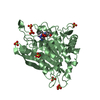
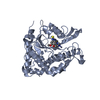

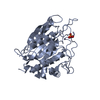

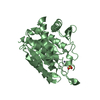
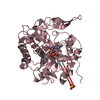
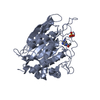
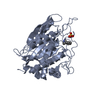

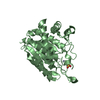
 PDBj
PDBj



